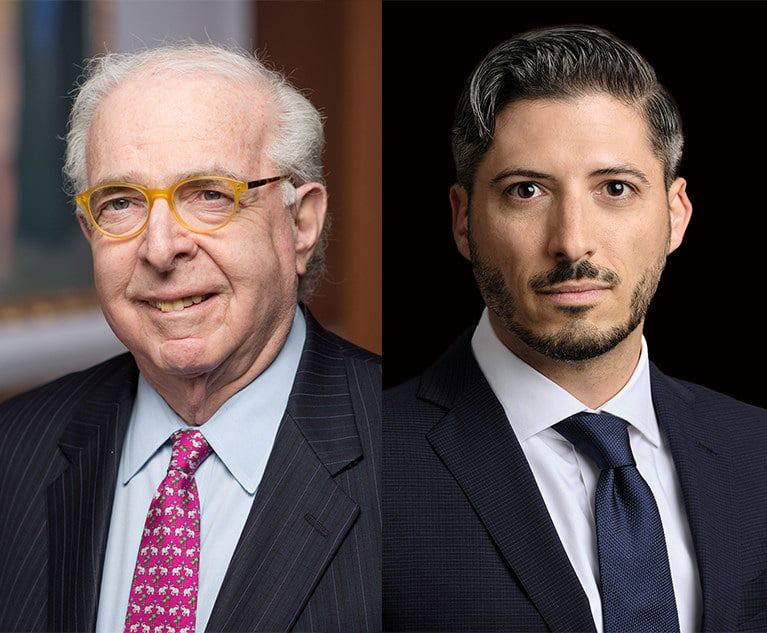 Credit: Adobe
Credit: Adobe Mediating Parties Beware! Potential Pitfalls and States' Varying Mediation Privileges
Mediation can be a useful tool to attempt to resolve high-stakes matters without incurring hefty legal fees, and without the publicity and attention that can come from litigating in open court.
April 13, 2023 at 09:00 AM
6 minute read
In recent years, parties and courts have viewed mediation as an attractive alternative for resolving disputes, and with good reason. Mediation can be a useful tool to attempt to resolve high-stakes matters without incurring hefty legal fees, and without the publicity and attention that can come from litigating in open court. However, states vary in their applications of confidentiality and privilege protections associated with mediations. Therefore, before deciding how much information to provide a mediator or the other party in a mediation, disputing parties should be cognizant of the jurisdiction of both their present dispute, and jurisdictions of potential future disputes that may relate to similar underlying facts.
Variations Across Jurisdictions
Several jurisdictions have adopted the Uniform Mediation Act (the UMA), including Georgia, Hawaii, Idaho, Illinois, Iowa, Nebraska, New Jersey, Ohio, South Dakota, Utah, Vermont, Washington and Washington, D.C. One of the UMA's core directives is to ensure the ability for mediating parties to depend on the confidentiality of the proceedings and accompanying communications. Indeed, the UMA protects all "mediation communications" from disclosure, and defines such communications broadly as any statement during the mediation or "made for purposes of" considering, conducting, or participating in a mediation. Uniform Mediation Act Sections 2, 4, U.L.A. MED §§ 2, 4 (2003). However, the UMA makes clear that the privilege is not limitless, as evidence or information that is "otherwise admissible or subject to discovery" is not "protected from discovery solely by reason of its disclosure or use in a mediation." In other words, parties cannot shield a document from discovery simply by attaching it to its mediation statement.
This content has been archived. It is available through our partners, LexisNexis® and Bloomberg Law.
To view this content, please continue to their sites.
Not a Lexis Subscriber?
Subscribe Now
Not a Bloomberg Law Subscriber?
Subscribe Now
NOT FOR REPRINT
© 2025 ALM Global, LLC, All Rights Reserved. Request academic re-use from www.copyright.com. All other uses, submit a request to [email protected]. For more information visit Asset & Logo Licensing.
You Might Like
View All
Art of the Settlement: Trump Attorney Reveals Strategy in ABC Lawsuit

Evolving Legal Standards to Combat Disqualification of Arbitrators for Failing to Disclose Conflicts of Interest
8 minute read
Court of Appeals Holds that Arbitration Agreements Can Be Formed Through ‘Clickwrap’ Process
8 minute read
Law Firms Mentioned
Trending Stories
Who Got The Work
J. Brugh Lower of Gibbons has entered an appearance for industrial equipment supplier Devco Corporation in a pending trademark infringement lawsuit. The suit, accusing the defendant of selling knock-off Graco products, was filed Dec. 18 in New Jersey District Court by Rivkin Radler on behalf of Graco Inc. and Graco Minnesota. The case, assigned to U.S. District Judge Zahid N. Quraishi, is 3:24-cv-11294, Graco Inc. et al v. Devco Corporation.
Who Got The Work
Rebecca Maller-Stein and Kent A. Yalowitz of Arnold & Porter Kaye Scholer have entered their appearances for Hanaco Venture Capital and its executives, Lior Prosor and David Frankel, in a pending securities lawsuit. The action, filed on Dec. 24 in New York Southern District Court by Zell, Aron & Co. on behalf of Goldeneye Advisors, accuses the defendants of negligently and fraudulently managing the plaintiff's $1 million investment. The case, assigned to U.S. District Judge Vernon S. Broderick, is 1:24-cv-09918, Goldeneye Advisors, LLC v. Hanaco Venture Capital, Ltd. et al.
Who Got The Work
Attorneys from A&O Shearman has stepped in as defense counsel for Toronto-Dominion Bank and other defendants in a pending securities class action. The suit, filed Dec. 11 in New York Southern District Court by Bleichmar Fonti & Auld, accuses the defendants of concealing the bank's 'pervasive' deficiencies in regards to its compliance with the Bank Secrecy Act and the quality of its anti-money laundering controls. The case, assigned to U.S. District Judge Arun Subramanian, is 1:24-cv-09445, Gonzalez v. The Toronto-Dominion Bank et al.
Who Got The Work
Crown Castle International, a Pennsylvania company providing shared communications infrastructure, has turned to Luke D. Wolf of Gordon Rees Scully Mansukhani to fend off a pending breach-of-contract lawsuit. The court action, filed Nov. 25 in Michigan Eastern District Court by Hooper Hathaway PC on behalf of The Town Residences LLC, accuses Crown Castle of failing to transfer approximately $30,000 in utility payments from T-Mobile in breach of a roof-top lease and assignment agreement. The case, assigned to U.S. District Judge Susan K. Declercq, is 2:24-cv-13131, The Town Residences LLC v. T-Mobile US, Inc. et al.
Who Got The Work
Wilfred P. Coronato and Daniel M. Schwartz of McCarter & English have stepped in as defense counsel to Electrolux Home Products Inc. in a pending product liability lawsuit. The court action, filed Nov. 26 in New York Eastern District Court by Poulos Lopiccolo PC and Nagel Rice LLP on behalf of David Stern, alleges that the defendant's refrigerators’ drawers and shelving repeatedly break and fall apart within months after purchase. The case, assigned to U.S. District Judge Joan M. Azrack, is 2:24-cv-08204, Stern v. Electrolux Home Products, Inc.
Featured Firms
Law Offices of Gary Martin Hays & Associates, P.C.
(470) 294-1674
Law Offices of Mark E. Salomone
(857) 444-6468
Smith & Hassler
(713) 739-1250






